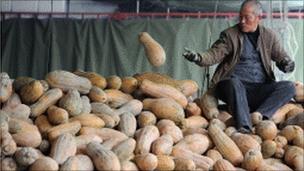China's inflation steadies on government price measures
- Published
Chinese inflation stabilised in February, helped by government and central bank measures to rein in price growth.
Consumer prices rose 4.9% from a year earlier, the same rate as in January, the National Bureau of Statistics said.
Analysts had forecast a figure nearer 4.7%, but said it was more significant that the rate of growth had steadied.
They said it may show that China was managing to rein in inflation without hurting economic growth.
However, they added that it was too early to say for certain that the inflationary trend had broken, and that they expected the government and central back to keep taking measures to contain price growth.
The Chinese government has set a target of 4% inflation for this year.
Weir Yao from Societe Generale said that while consumer price growth was stabilising, the "risk is still significantly on the upside".
"It means the central bank will probably stay on the course of tightening," the analyst said.
Tightening measures
Rising food prices are of major concern in China, where poor families spend up to half their incomes on food.
The central bank has raised interest rates three times in recent months to battle high inflation.
It has also increased bank reserve requirements in an effort to stop them lending as freely.
Analysts had worried that these tightening measures would slow down the booming Chinese economy.

China's government has been trying to boost the supply of food to slow the rate of inflation
However, these concerns eased after separate economic figures out today showed that industrial production accelerated in the first two months of the year.
In January and February, industrial output climbed by 14.1% from the same period in 2010. Output was up 13.3% in December.
"The economy is performing quite well," said Wang Hu from Guotai Junan Securities in Beijing.
However, the analyst said that economic growth will probably slow in coming months, and that may well help bring down the rate of inflation.
"China's economy may start to slow down in the second quarter, and the consumer price index will also start to trend trend down in June," Mr Wang said.